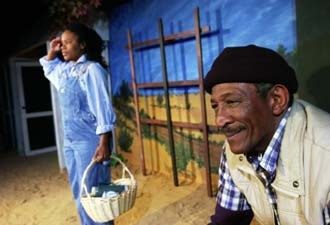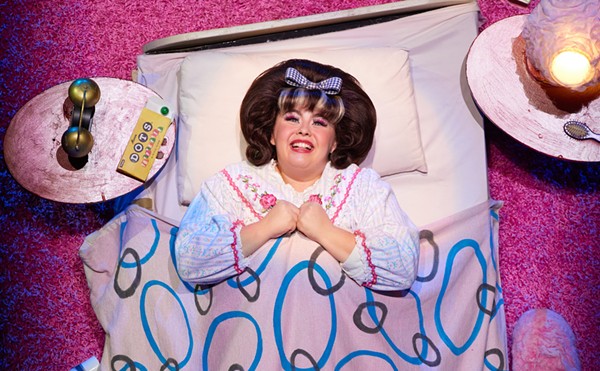|
A South African playwright confronts the emancipation of his people and his granddaughter Athol Fugard grew up in the Karoo, a semi-arid expanse in central South Africa, and, after international success as his country's leading playwright, returned to buy a house approximately 30 years ago. In 1985, he set The Road to Mecca in the village of New Bethesda, in an actual house not far from his. Valley Song, first performed in 1995, is also set in New Bethesda and features a character called "The Author" who, describing himself as "sick and tired of the madness and scramble of my life in the make-believe world of theater," returns to purchase property there. Less "make-believe" than most of Fugard's other work, Valley Song is staged memoir. The intimate production directed by Vincent Hardy that is currently running at the San Pedro Playhouse's Cellar Theater is an engaging chamber piece consisting of three characters, two actors, and no intermission. Valley Song begins and ends with an affectionate evocation of agrarian life in the fertile valley of the Sneeuberg Mountains. Much of the rest consists of an old man's reminiscences. Narrative and lyrical, the play is scarcely dramatic, if drama is defined by meaningful conflict. Tensions between a grandfather who clings to ancient ways and a granddaughter who yearns for novelty provide what conflict there is, but each character seems from the outset reconciled to gentle discord. Valley Song derives its power less from the incompatible desires of Abraam and Veronica Jonkers than from Fugard's ability to summon up a corner of South Africa at a crucial transitional moment. The time is the early 1990s, just after apartheid, the system of legalized racism that governed South Africa for more than four decades, was dismantled. Abraam, a 75-year-old tenant farmer known as "Old Buks" to white folks and "Oupa" to his granddaughter, is proud that he still works a full day cultivating someone else's land. Under the apartheid hierarchy that placed whites at the top and blacks at the bottom, the Jonkers were "coloureds" - mixed-race people who enjoyed limited privileges, subordinate to whites. Veronica, a talented, perky 17-year-old, balks at limits and resolves to move to Johannesburg to become a famous singer.
Oupa has brought Veronica up by himself and, beyond a natural reluctance to see his beloved dependent declare her independence, has reason to oppose her plans. Throughout the play, Oupa discloses to Veronica details of her origins. When she was just about Veronica's age, her mother stole money from Oupa and ran away to the big city. She died after giving birth to Veronica, and Oupa's wife died after retrieving the baby from Johannesburg. Fugard himself directed the original production of Valley Song and also played two parts, Abraam and The Author. A swarthy man of mixed Afrikaaner and English background, Fugard can pass for "coloured." And it is no stretch for him to impersonate The Author. But in the San Antonio production, African American Earley B. Teal lacks the ambiguous pigmentation to be both Author and Oupa. Yet he occupies the stage with the authority of his years, and he differentiates between the two roles by adjusting his posture and his cap. In both parts, he commands attention and respect. Afrikaans is widely spoken in the Karoo, by coloureds and whites, but Tealy's attempt to mimic an Afrikaans accent is the weakest part of his performance.
Aisha Minor-McGhee is more successful in capturing the intonations of the Karoo, both speaking and singing. Her voice is lovely enough to make credible a naive bid for fame and fortune in the metropolis. As she pauses on her way out of New Bethesda and Oupa's life, she sings a moving farewell to the valley and the grandfather she loves. It is a miniature version of Valley Song itself, a valediction for a vanishing world that, though rife with injustice, provided Abraam (the quintessential patriarch) with a clear standard for what it is to be a good man. "The world belongs to you," says The Author, aware of the perils lurking in the new order, to Veronica. How you gonna keep her down on the farm? Bored with her static Karoo village, Minor-McGhee's Veronica is any adolescent who has outgrown the nest. But she is also the New South Africa - fresh, free, and facing enormous problems, including unemployment, AIDS, and crime. Left behind are two old men who are equally fond of the valley. Teal's poignant double performance suggests that white and coloured were not so different after all. •
|

KEEP SA CURRENT!
Since 1986, the SA Current has served as the free, independent voice of San Antonio, and we want to keep it that way.
Becoming an SA Current Supporter for as little as $5 a month allows us to continue offering readers access to our coverage of local news, food, nightlife, events, and culture with no paywalls.
Scroll to read more Arts Stories & Interviews articles
Newsletters
Join SA Current Newsletters
Subscribe now to get the latest news delivered right to your inbox.















